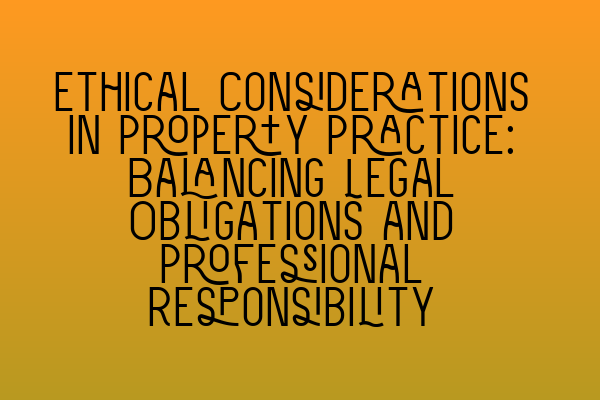As property law solicitors, we have a duty to not only uphold our legal obligations, but also to act in an ethically responsible manner. Balancing legal requirements and professional responsibility is crucial in ensuring that we provide the highest quality service to our clients while also maintaining the integrity of the legal profession.
When it comes to property practice, there are several ethical considerations that must be taken into account. In this blog post, we will explore these considerations and discuss how they can be effectively balanced with our legal obligations.
The Duty of Confidentiality
Confidentiality is a fundamental principle of the solicitor-client relationship. As property law solicitors, we have a duty to maintain the confidentiality of our clients’ information and not disclose it without their consent.
However, there are situations where the duty of confidentiality may conflict with our legal obligations. For example, if we become aware of a client’s illegal activities or intentions, we may be required to disclose this information to the appropriate authorities. In such cases, it is essential to carefully navigate the balance between client confidentiality and our legal obligations.
Related Article: SQE 1 Practice Exam Questions
Avoiding Conflicts of Interest
Conflicts of interest can arise in property practice when our professional obligations to multiple clients or parties come into conflict.
For example, if we are acting for both the buyer and seller in a property transaction, there is a potential conflict of interest. In such cases, we must ensure that we are acting impartially and in the best interests of both parties.
Disclosing potential conflicts of interest to clients and obtaining their informed consent is vital to maintaining ethical practice. If a conflict cannot be appropriately managed, we may have to decline or cease acting for one or both parties to preserve our professional integrity.
Related Articles: SQE 1 Practice Mocks FLK1 FLK2
Professional Competence and Continuing Education
As property law solicitors, it is essential to continually update and develop our professional competence to provide the best possible service to our clients. Staying abreast of changes in property law, regulations, and market conditions is crucial.
Continuing professional development (CPD) programs, attending industry seminars, and staying engaged with legal updates are integral to maintaining our professional competence. By dedicating time and resources to ongoing education, we can ensure that our clients receive accurate and up-to-date advice.
Related Article: SQE 2 Preparation Courses
Avoiding Unlawful Discrimination
Unlawful discrimination, whether it is based on race, gender, religion, sexuality, or other protected characteristics, has no place in property practice. It is our ethical responsibility as solicitors to treat all clients, colleagues, and parties involved in property transactions with equal respect and fairness.
We must ensure that our advice and actions are free from any form of discrimination. By promoting diversity and inclusivity within our own practice and advocating for fair treatment in the wider legal profession, we can contribute to a more just and equitable society.
Related Article: SQE 1 Preparation Courses
Conclusion
As property law solicitors, we face numerous ethical considerations in our practice. Balancing legal obligations and professional responsibility is essential to uphold the highest standards of legal practice and provide the best service to our clients.
By maintaining client confidentiality, avoiding conflicts of interest, continuously improving our professional competence, and promoting non-discrimination, we can navigate the ethical challenges of property practice successfully.
Related Article: SRA SQE Exam Dates
